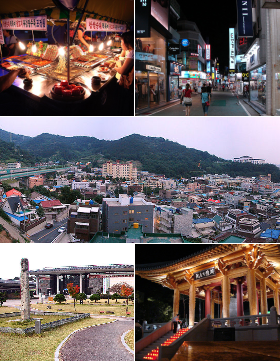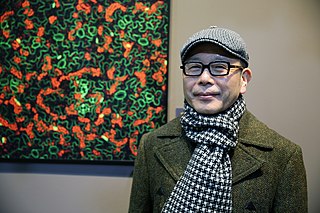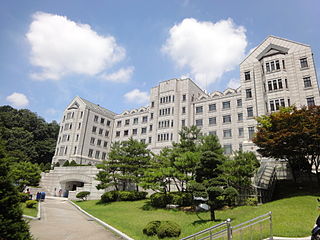Related Research Articles

Comfort women were women and girls forced into sexual slavery by the Imperial Japanese Armed Forces in occupied countries and territories before and during World War II. The term comfort women is a translation of the Japanese ianfu, a euphemism that literally means "comforting, consoling woman". During World War II, Japanese troops forced hundreds of thousands of women from Australia, Burma, China, the Netherlands, the Philippines, Japan, Korea, Indonesia, East Timor, New Guinea and other countries into sexual enslavement for Japanese troops; however, the majority of the women were from Korea. Many women died due to brutal mistreatment and sustained physical and emotional distress. After the war, Japan denied the existence of comfort women, refusing to provide an apology or appropriate restitution, which damaged Japan's reputation in Asia for decades. Only in the 1990s did the Japanese government begin to officially apologize and offer compensation. However, apologies from Japanese officials have been criticized as insincere, and Japanese government officials have continued to deny the existence of comfort women.

Gwangju, formerly romanized as Kwangju, is South Korea's sixth-largest metropolis. It is a designated metropolitan city under the direct control of the central government's Home Minister. The city was also the capital of South Jeolla Province Province until the provincial office moved to the southern village of Namak in Muan County in 2005 because Gwangju was promoted to a metropolitan city and was independent of South Jeolla Province.
John Mark Ramseyer is an American legal scholar who is the Mitsubishi Professor of Japanese Legal Studies at Harvard Law School. He is the author of over 10 books and 50 articles in scholarly journals. He is co-author of one of the leading corporations casebooks, Klein, Ramseyer & Bainbridge, Business Associations, Cases and Materials on Agency, Partnerships, LLCs, and Corporations, now in its 10th edition. In 2018 he was awarded Japan's Order of the Rising Sun, Gold Rays with Neck Ribbon in recognition of "his extensive contributions to the development of Japanese studies in the U.S. and the promotion of understanding toward Japanese society and culture."
Censorship in South Korea is implemented by various laws that were included in the constitution as well as acts passed by the National Assembly over the decades since 1948. These include the National Security Act, whereby the government may limit the expression of ideas that it perceives "praise or incite the activities of anti-state individuals or groups". Censorship was particularly severe during the country's authoritarian era, with freedom of expression being non-existent, which lasted from 1948 to 1993.

Anti-Japanese sentiment in Korean society has its roots in historic, cultural, and nationalistic sentiments.
Lee Jung-Hyo is a South Korean former football player and current manager of Gwangju FC.
Noel Beldon Reynolds is an American political scientist and an emeritus professor of political science at Brigham Young University (BYU), where he has also served as an associate academic vice president and as director for the Foundation for Ancient Research and Mormon Studies (FARMS). He was a member of the BYU faculty from 1971 to 2011. He has also written widely on the theology of the Church of Jesus Christ of Latter-day Saints, of which he is a member.

Kim Jihn-eui is a South Korean theoretical physicist. His research interests concentrate on particle physics and cosmology and has many contributions to the field, most notably the suggestion of the invisible axion.

Kim Sain or Kim Sa-in is a South Korean poet, literary critic, and professor of creative writing at Dongduk Women's University. Kim has been appointed as the 7th President of the LTI Korea in the Ministry of Culture, Sports, and Tourism of South Korea, which is an Undersecretary-level position.

Hong Gil Nam is a South Korean biologist teaching in the Department of New Biology of Daegu Gyeongbuk Institute of Science and Technology and leading research as director of the Center for Plant Aging Research. His research interests include comparative aging in diverse kingdoms, including plant and animals, to reveal aging mechanisms among species, cross-kingdom interaction between plants and animals, and biochemistry at nano and micro levels. He is the founder and former director of the Biological Research Information Center, a member of the Korean Academy of Science and Technology, and has served on the editorial board in Molecular Plant since 2013.
Edward Willett Wagner was an American academic and a professor of Korean studies at Harvard University; he was an expert on Korean aristocracy during the Joseon period.
Lee Yong-soo is a former comfort woman from South Korea. Lee was forced to serve as a comfort woman during World War II by the Imperial Japanese Army. She is one of the youngest comfort women still living.

Mark Lee, known mononymously as Mark, is a Canadian rapper, singer, songwriter and dancer based in South Korea. He is a member of the South Korean boy band NCT and its fixed sub-units NCT 127 and NCT Dream, as well as the South Korean supergroup SuperM.

The R. K. Cho Economics Prize is awarded by Yonsei University in Seoul, South Korea to academics in the field of economics who have contributed to the development of scholarship and education. As of 2018, the prize includes a plaque, a medal, and a monetary award of ₩100 million.

Cho Kuk is a South Korean politician who served as the member of the 22nd National Assembly of South Korea from May to December 2024, when he lost his seat following the Supreme Court of Korea decision to uphold his two-year prison sentence for document falsification. He is a leader and founder of the Rebuilding Korea Party.

Mark Tuan, also known mononymously as Mark, is an American rapper and singer. He is a member of the South Korean boy group Got7.

Noh Do Young is a South Korean physicist specializing in condensed matter physics and materials science using synchrotrons and XFELs. He has developed and applied various frontier X-ray diffraction methods to study condensed matter systems, including recent coherent X-ray diffraction imaging technique. His research has utilized a number of synchrotron radiation facilities, such as Advanced Photon Source, SPring-8, National Synchrotron Light Source, PLS, and X-ray free electron lasers, including SCALA and PAL-XFEL.
Kim Yong-un was a South Korean mathematician, philosopher, and critic of civilisations. He was active in various fields of mathematics, philosophy, anthropology, and linguistics, and is considered to have established the history of mathematics in Korea. He was a professor of mathematics at Hanyang University.

Jie-Hyun Lim is a South Korean historian, writer, and "memory activist." He is a full professor of transnational history and the director of the Critical Global Studies Institute at Sogang University, Seoul, who conceptualized paradigms of "Mass Dictatorship" and "Victimhood Nationalism." Since Lim founded the Research Institute of Comparative History and Culture in 2004, he has carried out a series of international projects, including the "East Asian History Forum for Criticism and Solidarity" and the "Flying University of Transnational Humanities."
Ross King is a Canadian linguist and Koreanist. He has been the head of the Department of Asian Studies at the University of British Columbia since July 2008.
References
- ↑ "A Look at Korea as a Frog Outside the Well -- An Outsider's Perspective on Korean History". www.koreasociety.org. Retrieved 2024-12-01.
- 1 2 3 4 최, 병천 (2024-04-09). 마크 피터슨 교수, 재미한국학교 동남부지역연합회 연수회서 강연. WorldKorean (in Korean). Retrieved 2024-11-30.
- ↑ 흥, 미희 (2024-01-23). 한국문화 전도사 마크 피터슨 교수, 일본 오사카에서 한국학 강연. worldkorean.net (in Korean). Retrieved 2024-11-30.
- 1 2 3 4 5 6 [사람속으로] 5.18 진실규명 마크 피터슨 교수. Kyunghyang Shinmun (in Korean). Retrieved 2024-12-01.
- ↑ "Mark A. Peterson". BYU Speeches. Retrieved 2024-12-01.
- ↑ "Mark Peterson: Korean History—World's Firsts and World's Bests". University of Notre Dame. 2015-10-08. Retrieved 2024-11-30.
- ↑ "우물 밖으로 나와 제대로 된 한국 역사를 바라봐야". The Korea Times (in Korean). Retrieved 2024-12-01.
- ↑ Kim, Boram (2021-02-18). "Korean studies expert refutes Harvard professor's 'comfort women' claim". Yonhap News Agency . Retrieved 2024-11-30.
- ↑ "Korean studies expert refutes Harvard professor's claim on comfort women". Korea.net . 2021-02-18. Retrieved 2024-12-01.